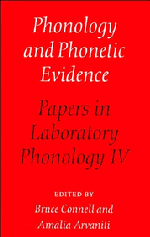Book contents
- Frontmatter
- Contents
- List of contributors
- Acknowledgments
- 1 Introduction
- I Features and Perception
- 2 Intermediate properties in the perception of distinctive feature values
- 3 A double-weak view of trading relations: comments on Kingston and Diehl
- 4 Speech perception and lexical representation: the role of vowel nasalization in Hindi and English
- 5 Processing versus representation: comments on Ohala and Ohala
- 6 On the status of redundant features: the case of backing and rounding in American English
- 7 The perceptual basis of some sound patterns
- II Prosody
- III Articulatory Organization
- Subject index
- Index of names
- Index of languages
5 - Processing versus representation: comments on Ohala and Ohala
Published online by Cambridge University Press: 03 May 2011
- Frontmatter
- Contents
- List of contributors
- Acknowledgments
- 1 Introduction
- I Features and Perception
- 2 Intermediate properties in the perception of distinctive feature values
- 3 A double-weak view of trading relations: comments on Kingston and Diehl
- 4 Speech perception and lexical representation: the role of vowel nasalization in Hindi and English
- 5 Processing versus representation: comments on Ohala and Ohala
- 6 On the status of redundant features: the case of backing and rounding in American English
- 7 The perceptual basis of some sound patterns
- II Prosody
- III Articulatory Organization
- Subject index
- Index of names
- Index of languages
Summary
Introduction
The data reported by Ohala & Ohala, and by Lahiri & Marslen-Wilson (1991, 1992) can be explained by a processing model in which surface acoustic -phonetic information is used to constrain perceptual decisions. Nevertheless, this interpretation is perfectly consistent with the underspecification hypothesis. Like Ohala & Ohala (henceforth O&O), I have a good deal of sympathy with the theoretical concept of an underspecified mental lexicon, as proposed by Lahiri & Marslen-Wilson (henceforth L&MW), but I do not believe that the data presented by them, or by O&O, give us any direct insight into the nature of lexical representations. My main point, therefore, is that it is inappropriate to find a unified representational explanation of these data in terms of stored forms which either match surface phonetics or are underspecified. An appropriate explanation is one based on the processing of information given in the speech signal.
The interpretation I will give has five principal features. First, I make the assumption that listeners do use surface phonetic information in perception: they do not depend solely upon underspecified representations, as argued by L&MW. On this point, I am in agreement with O&O.
Second, I assume that listeners base their decisions primarily on the information available in the input, rather than primarily on stored representations onto which the input has been mapped. Again, this seems to be a view with which O&O are in agreement (but which they fail to describe explicitly), and is counter to the position held by L&MW.
- Type
- Chapter
- Information
- Phonology and Phonetic EvidencePapers in Laboratory Phonology IV, pp. 61 - 67Publisher: Cambridge University PressPrint publication year: 1995

